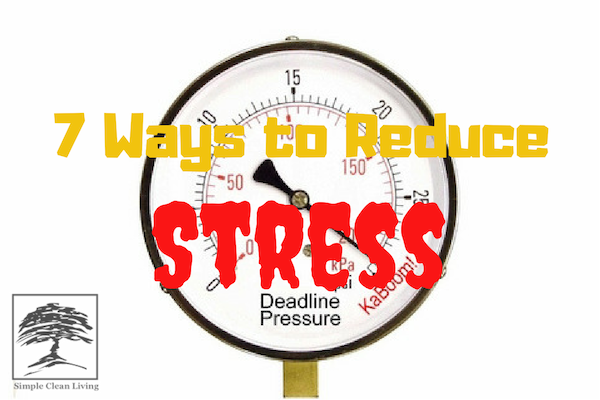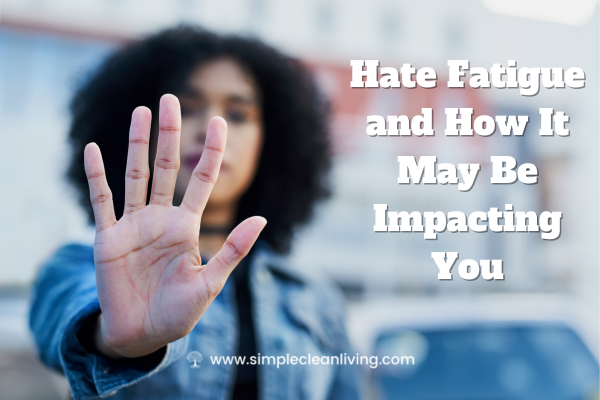Notice: I’m an affiliate for Amazon as well as other companies. Any links in this article may be affiliate links. I always appreciate it if you purchase something using my affiliate links. Doing so helps me to raise a little extra money that pays for the costs of running this site. And it allows me to continue bringing you quality content, all without costing you a thing! Thanks!
Stress is everywhere. And it’s safe to say that most people are overwhelmed and stressed out! We are constantly being subjected to stressful things all day, every day. And yet in spite of all of the stress we face, few people take the time to practice stress management so they can reduce stress!
We have been desensitized to the stress in our lives to the point that we can no longer recognize warning messages that our bodies are sending us. It is these little warning signs that clue us in we are not managing stress as effectively as we should be.
Unfortunately, we have become so absorbed in other things that we often neglect the cues that our bodies send. We feel hunger when we need food. We get thirsty if we need water. When our bodies need sleep, we get tired. But there is so much distraction in our personal lives, that it is not uncommon to stop paying attention to what our bodies are trying to tell us.
The result of the disregard of our bodily signals is an illness, dis-ease, and problems with behavior.
Some of the symptoms that can occur when you don’t pay attention to your body.
- Pain throughout the body such as headaches, neck, shoulder and back pain.
- Heart issues such as high blood pressure, palpitations and heart disease.
- Digestive issues such as an upset stomach, nausea, diarrhea or even constipation
- Sleep problems
- Immune issues such as frequent colds and flu
- Skin problems
- Autoimmune diseases
- Obesity
- Loss of sex drive
- Mood issues such as anxiety, anger, insecurity, depression
- Fatigue, lethargy, problems concentrating and lack of focus
- Memory problems
- Addictions
- Social isolation
- Relationship issues
Stress is everywhere. So how can you recognize it and reduce it so that you can be healthier? First, you have to recognize where the stress is coming from.
Here are the top sources of stress for most people
Money and finances
This is the top source of stress for the overwhelming majority of people. It is made even worse during times when the economy is struggling. Having large amounts of debt, being unemployed, or having unexpected expenses occur all can cause financial stress.
Family
Conflict, disagreements, and even personality differences can create stress within a family. But not all stress is bad stress! Even positive family events can contribute to the stress load!
Career
Have you ever worked a job that was frustrating, had colleagues that tried your patience, or dealt with salary disputes or frustrations? That is all stress related to your career.
Major life events
Retirement, moving, getting married, getting separated and divorced, having a baby, changing jobs or careers, illness or injury, loss of job, death of a family member or close friend, bankruptcy, being arrested/going to court/serving jail time, having a child move away from home, having a child get married are all major life events that are stressful. In fact, these are all on the list of the top stressful things that can happen in your life….even when they are happy!
Juggling too many things
Do you have too much on your calendar? It is during these times that you simply struggle to find time to do anything to take care of the stress and unwind. It is during these times that you may also get less than enough sleep. You may also eat more junk food….or not eat at all, which also contributes to stress in the body!
Not getting enough sleep
If you have times when you get less than 7-9 hours of sleep a night, for two or more consecutive nights, it creates a great deal of stress on your body. It also makes it much more challenging to do the things that you need to do in order to manage stress.
Watching or reading the news
There is a saying in the news world that “If it doesn’t bleed, it doesn’t lead”. The news thrives on negativity because shiny, happy news doesn’t get as much traction as the negative stuff. And we live in a world where the news is available 24/7, so it’s easy to be inundated with negative news stories. That can stress you out!
This is only a partial list of the things that create stress in our lives. So, what do we do to help reduce the stress in our lives? When you allow yourself a little time to let go of tension, you will be amazed at how much better you feel and how much more you actually accomplish!
Here are a few things you can do to reduce stress!
Breathe!
A lot of times when we are stressed, or focusing hard on something, we forget to breathe. And most people are not even aware that they are holding their breath. Lack of oxygen creates more stress on the body. So it is important to make sure that we take some time to do a little deep breathing to help relax us.
Here’s a simple breathing exercise, that can reduce stress significantly in two minutes:
Breathe in for a count of four seconds. Hold the breath for a count of four seconds. Exhale the breath slowly for a count of 8 seconds.
Sound simple? Well, it is. Deep breathing exercises like this one are the quickest way to let go of tension. Many physicians, especially cardiologists are prescribing deep breathing exercises to their patients to help eliminate stress. Doing the simple exercise above for a minute several times a day is guaranteed to help you ease tension and feel better.
Laugh
Laughing is actually highly stress relieving! So when you take some time to watch a funny show or video or share some good jokes with a friend, it can actually lower stress levels quickly.
Say no to the news
Watching too much of the nightly news is highly stressful because of the overwhelming negative focus. Instead of staying glued to one of the cable news channels, you can opt to read over the news online for a few minutes every day. That will allow you to know what is going on in the world, without being consumed by the stress of being connected with it all of the time.
Listen to soothing music
Turn on some good relaxing, soft instrumental music. Classical, jazz, new age, all can help to reduce stress. Music that is too loud can actually increase stress levels because the noise overstimulates the body. So softer is better when you are feeling stressed.
Learn that it is okay to say “no”
Many people struggle to say no when others ask them to do things. Saying no makes them feel guilty, and so they will accept, even if they already have a lot on their plate. But learning to say no can actually be empowering and can reduce the stress load and overwhelm that comes from having too many obligations. Most people will understand.
Get plenty of rest
We all need at least 7-9 hours of sleep a night to recharge our batteries. Getting enough good, quality sleep will help us to better face any other stress that comes our way as well.
Take your vitamins
Having enough of the right nutrients, especially B-complex vitamins, and magnesium is a vital part of managing stress. Opt to get nutrients from high-quality food and supplements.
The most important thing is that you take the time to help reduce stress in your life. It not only benefits your health, but you will get more done each day, and you will feel better too!
Happy relaxing!
Photo credit: © Ken Pilon | Dreamstime.com




